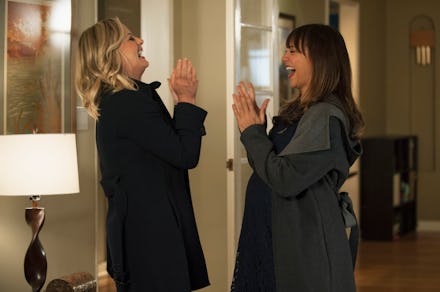Best Friends and Great Couples Have Something Surprisingly Intimate in Common

As we said farewell to Parks and Recreation on Tuesday night, we also said goodbye to the enduring, waffle-laden friendship of Leslie Knope and Ann Perkins. What made it so great? The indispensable and constant flow of compliments.
Throughout the show's seven-season run, Leslie could be heard spouting off deep and often hilarious compliments like "Ann, you're a genius! Your brain is almost as perfect as your face."
She might be onto something. Science shows that frequent, genuine exchange of compliments is one of the most telling signs that you're in an awesome relationship. Compliments, when they're done right, are valuable because they show both intimacy and vulnerability. The best compliments, the ones that glue friendship and romances together, put both the recipient but also the speaker's true selves on the line in a wonderful way.
Getting vulnerable: As noted in a study by linguist Janet Holmes, compliments work best when they "increase or consolidate the solidarity between speaker and addressee." In other words, compliments build intimacy when they express a shared value between two people.
"A successful compliment must be about something that's recognized by both the complimenter and the complimentee as having value," notes the New Inquiry, whether it's a shared appreciation for fashion ("I love your sweater") or a shared virtue, such as intelligence ("That was a really great point you made").
It's that explicit acknowledgment of shared values that also makes saying "thank you" to a compliment so hard — accepting the compliment is acknowledging its value, which in turn makes us vulnerable.
Instead, we often deflect compliments by responding with what a 1990 study in Language in Society called "comment history," those brief, self-effacing explanations of the thing being complimented.
In fact, in the same study, participants responded to praise with "thank you" only 10% to 29% of the time, because they reportedly didn't know how to respond to compliments that meant a lot to them. As noted by the New Inquiry, this response reflects our own "embarrassment" over showing how much we care — an uncomfortable feeling that, in turn, might affect our hesitance to give compliments to others. But showing how much we can is the exact kind of vulnerability that builds intimacy.
It's no mistake that one intimacy-building exercise from the New York Times-inspired 36 questions app is "Alternate sharing a positive characteristic of your partner. Share a total of five items."
It's about closeness: Compliments also increase intimacy by exposing just how much a person knows about you, from your ambitions to your insecurities. "I would say that compliments which relate to real accomplishments are more relationship-enhancing, as otherwise they're perceived as phony," Susan Krauss Whitbourne, a professor of psychology at the University of Massachusetts Amherst specializing in adult personality development, told Mic. "The people who know you the best can read through those easily. If a compliment seems forced or superficial, it can have the opposite effect."
That's why highly personalized compliments are so meaningfully intimate: We realize they come from people who truly get us, which leads us to recognize the quality of the relationship.
As the Language in Society study found, the form of the compliment matters. Women are more likely to construct compliments in personal terms ("You look great in that sweater!") and men in general terms ("Great sweater.").
Compliments are meaningful when they draw upon shared knowledge and invoke shared history, as one finds when using the 36 questions app with friends. For example, telling someone "I love the wit in your writing" might remind them of that freshman-year college writing program you attended together.
That may be why the appearance-oriented compliments in the above Inside Amy Schumer sketch fall flat, while the highly personal compliments you get from the 36 questions exercise help to solidify friendship and romance.
Praise them like you should: It makes sense that a relationship with positive compliments is happier and more intimate than one without — and that a lack of compliments can affect how we feel about a relationship.
A 2004 study from the Western Journal of Communication examined couples' compliments and found that our perception of our own and our partner's compliments affected relationship satisfaction positively. While the types of compliments given between friends and lovers differ in form, the study found that most memorable compliments were not about appearance or talent, but emotion-based (we prefer "Your smile makes me feel so close to you" over "Nice backpack").
In the case of the study, the greater the number of compliments given and received in a relationship, the happier it was.
In fact, a 2014 study of 5,000 people across ages and statuses from Open University found that we view giving compliments as one of the key factors for relationship health over time.
Step it up: Like so many other little things, compliments between partners and friends are an oft-overlooked part of a relationship. "We underutilize compliments for the simple reason that we take our nearest and dearest for granted," Whitbourne said. "Ask yourself when the last time was that you paid your friend or partner a compliment. If you can't remember when it was, then it's time to do so."
When we shower the object of our affection with endorsements, we remind them just how meaningful, intimate and specific our connection to them is. Genuine compliments that recognize someone's importance are the building blocks of true friendships and romantic relationships alike.
So go ahead, call someone a "poetic, noble land-mermaid." That's a true connection right there.